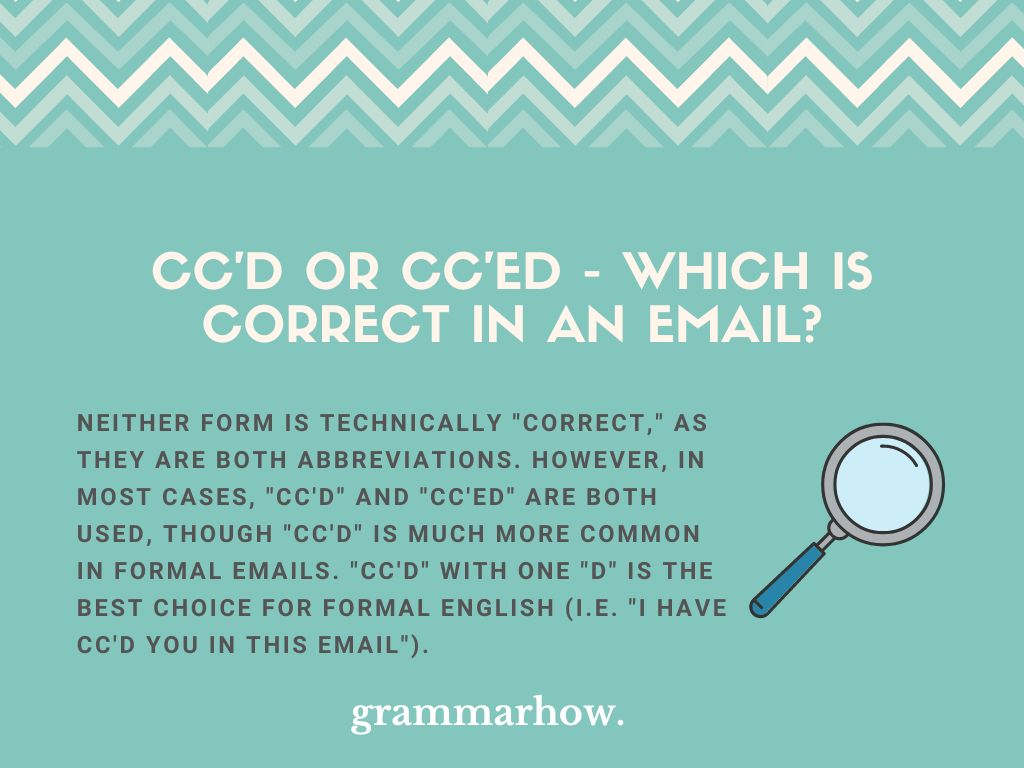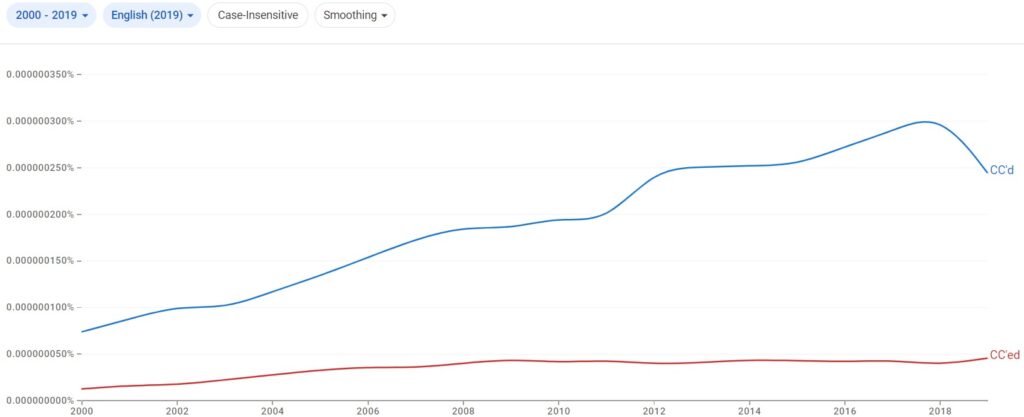When using “CC” as a noun, you need to know how the past tense form works. “CC’d” and “CC’ed” are viable options, but you need to understand the key differences. This article will explain everything you need to get right before using them yourself.
CC’d or CC’ed – Which Is Correct in an Email?
Neither form is technically “correct,” as they are both abbreviations. However, in most cases, “CC’d” and “CC’ed” are both used, though “CC’d” is much more common in formal emails. “CC’d” with one “d” is the best choice for formal English (i.e. “I have cc’d you in this email”).

This is an interesting situation where “CC’d” and “CC’ed” are both technically incorrect but still see common usage:
- I cc’d you on the email. I hope that’s okay!
- You have been cc’ed here for a reason. Hopefully, you can help us figure this out.
This is one of those rare occurrences where an abbreviation becomes a standalone verb form. It’s not common for this to happen in English (especially formal English).
Since it’s uncommon, it’s difficult to determine whether “CC’d” or “CC’ed” is more appropriate. One thing we can do is provide you with a graphical illustration of which is more popular.
“CC’d” is the most popular choice of the two past tense verb forms, according to Google Ngram Viewer.

This means only the “d” is required after the abbreviation to show that you “CC’d” someone in the past. “CC’ed” is still used, but it’s not nearly as popular.
CC’d
“CC’d” is the most popular way to use the verb form of “CC.” The extra “d” at the end shows you’re writing in the past tense.
It’s likely that “CC’d” is the more popular choice because people prefer to remove the unnecessary “E” vowel from the past tense. Since “CC” is already made of two consonants, keeping the past tense as a consonant makes sense.
- Was I supposed to be CC’d here?
- You have CC’d me again, but I’m not sure I belong here.
- I cc’d you on the email because I’d like your input. Can you help me out?
While “CC’d” might not be a technically correct spelling, it is still widely recognized in English. It’s so common that you’ll even see it in formal emails.
- Dear Mr. Parker,
- I have cc’d you in the following communication. I hope that’s good for you.
- All the best,
- Drew
It’s common to see “CC’d” in email formats. While it might not be “correct,” it is popular enough to work in formal English while ignoring most formal rules.
CC’ed
“CC’ed” is also correct, though it’s far less common. Most people avoid the “ed” ending for the past tense because it feels unnecessary to include two letters when “CC” is already only two letters.
You may use either “CC’d” or “CC’ed.” Nobody will tell you that one is “more correct” than the other. They are both technically incorrect anyway, so nobody would be right to tell you that one is better than the other.
- I have been CC’ed on these documents, though I’m not sure they apply to me.
- Will she be CC’ed in the future? I think that’ll be good for her.
- I have not been CC’ed on any of this. Why is that?
Again, you may use “CC’ed” in formal emails as well:
- Dear Ms. Perry,
- You were CC’ed in this email by accident. Please delete any correspondence you may have received.
- Thank you very much,
- Jon
When Is It Appropriate to Use CC’d and CC’ed?
It is almost always more appropriate to use “CC’d” and “CC’ed” over the unabbreviated “carbon copied.” “Carbon copied” is the long form of the abbreviations, but it is not required in formal or informal English.
You should stick with the abbreviations because they are more recognizable. They are so common that most people know what they mean without you having to explain more about them.
Don’t worry about using abbreviations like “CC” in formal English. Most business professionals welcome the use of abbreviations like this to keep things as simple and concise as possible.
Conclusion
“CC’d” and “CC’ed” are abbreviations of “carbon copied.” Technically, neither form is correct. However, they are very common formal and informal emails.
You should use “CC’d” rather than “CC’ed” as the past tense form. It’s the most common choice, making it the most suitable in your writing.

Martin holds a Master’s degree in Finance and International Business. He has six years of experience in professional communication with clients, executives, and colleagues. Furthermore, he has teaching experience from Aarhus University. Martin has been featured as an expert in communication and teaching on Forbes and Shopify. Read more about Martin here.
